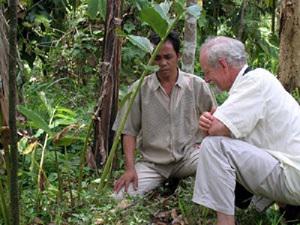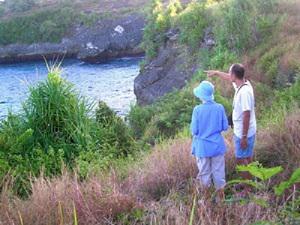Pak I Made Suarnatha
JED invites tourists to come to the villages to see and experience village life. The objectives of JED are to increase the incomes of the villages by diversifying and supplementing their agricultural livelihoods and to raise funds and awareness for conservation.

In the forest gardens of Pelaga.
In response to some of the problems brought to Bali by mass tourism in Bali, the Village Ecotourism Network (Jaringan Ekowisata Desa or JED) was launched by four villages in 2002. JED is owned and run by the communities of the four villages and one environment NGO, the Wisnu Foundation.

Ceningan Island walk.
Each village has a different character. Kiadan Pelaga village is a producer of organic coffee, located in the central Bali highlands where the air is cool and clean. Dukuh Sibetan village produces snakeskin fruit (salak), which gets it’s name from it’s smooth and scaly skin. The Sibetan farmers make Bali’s only salak wine. Tenganan Pegringsingan is an ancient village famous for double ikat weaving and it’s culture, which is different from other villages in Bali. The forest around Tenganan is one of Bali’s healthiest remaining natural forests. Nusa Ceningan is a small island off Bali’s east coast. The Ceningan people are seaweed farmers. The sea around Ceningan Island varies from crashing waves on the southern tip to coral gardens on the north, from the quiet shallows of the western plantations to the river-like flows dividing Ceningan from Penida Island on the east.
JED invites tourists to come to the villages to see and experience village life. Local guides escort visitors to the forest-gardens and explain the variety and uses of the plants. The visitors also learn about the governance and culture of the villages. Trekking, snorkelling (in Ceningan), and overnight family home stays are also available.
The objectives of JED are to increase the incomes of the villages by diversifying and supplementing their agricultural livelihoods and to raise funds and awareness for conservation. JED has been designed to ensure that income does not only benefit those community members practically involved in JED (through catering, guiding, hosting homestays etc), but the whole community. A percentage of profit is allocated to the banjar (community group) or village, a percentage to the local temple and a percentage to a fund for future environmental conservation projects. In the meantime JED is teaching both the Balinese and the visitors about environmentally responsible tourism. At the village level, the local guides are relearning about their ecosystems and finding new pride in their local natural resources. The hope is that JED will generate enough local cohesion and pride so as to provide a serious future contender for potentially damaging outside investment.